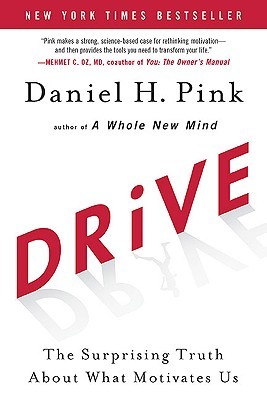 It seems incredulous that we’re approaching fifty blog posts on this site and we’ve not yet reflected on one of the key modern tomes relating to motivation: Daniel Pink’s Drive. It analyses how our primary motivator in the workplace - “seek reward and avoid punishment” - has remained largely unchanged since early industrial times. (Pay people more per widget, and they’ll increase their output of widgets.)
It seems incredulous that we’re approaching fifty blog posts on this site and we’ve not yet reflected on one of the key modern tomes relating to motivation: Daniel Pink’s Drive. It analyses how our primary motivator in the workplace - “seek reward and avoid punishment” - has remained largely unchanged since early industrial times. (Pay people more per widget, and they’ll increase their output of widgets.)
Yet this view of motivation is out-of-touch with both modern working life (where creativity and deep thought have replaced assembly-line production) and with society itself; where we aspire to more than just a roof over our heads, and work has become a necessary conduit to support personal and familial growth outside of the 9-to-5. Extrinsic motivation - rewarding people (often financially) - is no longer enough. If we want to get the best out of our teams, we need a new way of thinking.
The components of intrinsic motivation
Pink spends much of his book discussing the three core facets of intrinsic motivation:
- Autonomy: Being able to choose what work you do, and when/where you do it. You’ll probably still be working towards a known goal, but you’re free to choose how you get there.
- Mastery: Challenging yourself to improve your competence at key skills, through “deliberate practice”, with fast feedback as you go.
- Purpose: Understanding why you are doing what you’re doing - who will benefit from your work, and what meaning you are bringing to people’s lives.
Whereas extrinsic rewards fade over time - give someone more money, and eventually they’ll want MORE money - intrinsic benefits conversely increase over time. When a workplace fosters our intrinsic desires, we feel an increased sense of belonging, which is increasingly engrained as we embed ourselves within that organisation’s working culture.
Increasing your own intrinsic motivation
For those of us who are significantly career-driven, and especially if you’ve found yourself chasing after salary bumps, it’s worth taking stock of whether you’re caring enough about the intrinsic rewards of a role. Try to construct an elevator pitch of the person that you want to be: What do you want to accomplish, or be known for? In the book of life, what would your “sentence” be (how would people summarise what you were)? The journey to this destination might be long, but you can break it into smaller chunks, and reflect each day on whether you’re moving closer to where you want to be.
You can also develop your own “deliberate practice” initiatives: regular, challenging goals which play to your strengths and seek to eradicate your weaknesses. Mastery doesn’t happen overnight, but by creating an attainable regime, you can drill these techniques until they’re second nature.
Pink also recommends that one great way to explore what’s important is to take a year’s sabbatical from work. This may be the definition of “easier said than done”, but I undertook a smaller version of this myself when I first founded Mojovation Consulting. I was fortunate enough to be able to justify taking a couple of months’ break, to set myself up for a new intrinsically-satisfying career journey.
Improving intrinsic motivation in the workplace
While we’re each masters of our own career destinies, as organisations we can do much to help everyone in our teams. Pink lists off a huge number of ideas, perhaps without necessarily showing the research to reinforce how successful they are, but here are a few to think about:
- Giving employees some equivalent of “10% time” to focus on personal projects that help them to hone the skills that they use in their day-to-day role.
- When creating goals/objectives, ensure that the whole team is helping to shape them, so that everybody has a degree of buy-in on what the company is aiming towards.
- Design systems which assume good intent: for example, rather than designing a holiday system which aims to prevent a handful of people from exploiting the system (thereby disadvantaging the majority of people who will take an appropriate amount of leave, given the chance), give people the freedom and trust to shape their own way.
- Ask people whether they feel like they have enough autonomy/purpose in their everyday tasks, rather than just assuming (or hoping) that they have.
I’ve worked in some companies which have been fearful of implementing policies like this; a fear that helping people to pursue advancement opportunities on “company time” will result in those employees being headhunted by larger organisations with heftier wage bills. But by falling back on extrinsic concerns, they’re missing the point, one which was reiterated by Richard Branson in 2014: “Train people well enough so they can leave. Treat them well enough so they don’t want to.”
Key takeaways 📝
- Financial rewards are good, but they only go so far.
- The three key components of intrinsic motivation are autonomy, mastery and purpose.
- Organisations should strive to give people freedom to work in a way that makes them happy.

